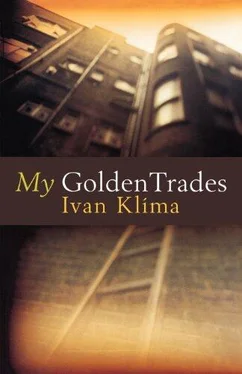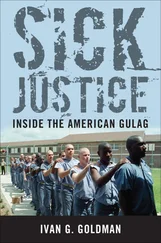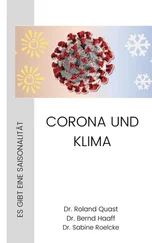Ivan Klima - My Golden Trades
Здесь есть возможность читать онлайн «Ivan Klima - My Golden Trades» весь текст электронной книги совершенно бесплатно (целиком полную версию без сокращений). В некоторых случаях можно слушать аудио, скачать через торрент в формате fb2 и присутствует краткое содержание. Год выпуска: 1998, Издательство: Granta UK, Жанр: Современная проза, на английском языке. Описание произведения, (предисловие) а так же отзывы посетителей доступны на портале библиотеки ЛибКат.
- Название:My Golden Trades
- Автор:
- Издательство:Granta UK
- Жанр:
- Год:1998
- ISBN:нет данных
- Рейтинг книги:4 / 5. Голосов: 1
-
Избранное:Добавить в избранное
- Отзывы:
-
Ваша оценка:
- 80
- 1
- 2
- 3
- 4
- 5
My Golden Trades: краткое содержание, описание и аннотация
Предлагаем к чтению аннотацию, описание, краткое содержание или предисловие (зависит от того, что написал сам автор книги «My Golden Trades»). Если вы не нашли необходимую информацию о книге — напишите в комментариях, мы постараемся отыскать её.
My Golden Trades — читать онлайн бесплатно полную книгу (весь текст) целиком
Ниже представлен текст книги, разбитый по страницам. Система сохранения места последней прочитанной страницы, позволяет с удобством читать онлайн бесплатно книгу «My Golden Trades», без необходимости каждый раз заново искать на чём Вы остановились. Поставьте закладку, и сможете в любой момент перейти на страницу, на которой закончили чтение.
Интервал:
Закладка:
'Please get out, driver,' said one. 'Your documents.' He spoke to me in the tone he probably used with criminals he was arresting. He was the smaller and rounder of the two. The other one, who was more robustly built, remained a few steps behind him.
I objected that his colleague in the other car, which was still behind us, had already seen my documents.
He was unmoved. He held his palm out and waited until I handed the papers over. He leafed through them for a while, and then he said something that surprised me. 'Sir, the way you've been driving suggests to me you've been drinking. Are you willing to submit to a breathalyser test?'
I protested. After all, I had been tested an hour ago, and since then they'd been constantly on my tail. It was highly unlikely that I would have drunk something while I was driving.
'Do you refuse to take the test?'
I sensed a trap, and besides, they were behaving like clowns, not me. I agreed to the test.
When I'd blown into the tube, he took it from me, turned his back, and declared that the tube had turned green. Was I aware of the consequences that this could have for me?
Though I had become used to most things, I was astonished. For years I have tried to stay out of the game that in this country is a substitute for politics, a game which one side plays dishonourably, while the other side, though it plays honourably, plays without hope. I don't take sides. Not out of cowardice or calculation; it's just that I have neither the strength, nor the time, nor the capacity for the game.
I know that bad political policies influence everyone's life, mine included, but I would not dare to claim, not even to myself, that I am sure enough of what are good policies to be able to persuade others.
I am not convinced that one has a right to one's own car or plane, or the satisfaction of all one's needs at a time when most of mankind is hungry. I don't know whose side I should take in the struggles and wars I hear about and read about every day, though I suspect that most of those struggles will soon be forgotten, whereas the stories of Antigone or Hamlet will live as long as humanity itself.
But all my doubts have not stifled within me the awareness that injustice must be resisted.
The tube couldn't have turned green. Show it to me!
He replied that he was not required to show me the tube. So he was, after all, ashamed to confront his claim with reality. He then began, somewhat incoherently, to explain that there were cases of mild intoxication in which the liquid
in the tube changed colour only slightly. It made no sense to show the tube to me because to my untrained eye, the colouration would be imperceptible. He was not suggesting that I had drunk a lot, but the tone of the liquid had altered and that meant I had failed in my duty as a driver and become a hazard on the road. His voice cracked. I suddenly saw that he was ashamed. He had been ordered to detain me with a charge of drinking and driving, without regard for the self-respect that he would have to repress to do so. He was not trying to persuade me so much as himself.
He realized that he hadn't been firm enough with me. He was through talking, he said. I'd been drinking and driving and therefore he was confiscating my driver's licence. The persons in the car would have to get out. I was to lock the vehicle, turn the keys over to him, and leave the car parked here until they decided what action to take.
I looked towards my car and saw a golden head of hair in the window: my daughter was anxiously watching a scene that would certainly stick in her memory far more vividly than better plays performed by better actors. Unfortunately, I had a role in this play, and how I acquitted myself would also stick in her memory.
No one was getting out of the car, I said. 'I will not give you my keys, and furthermore I will lodge an official complaint about your behaviour.'
'If you don't hand over your keys, you'll have to come with us.' His voice cracked again.
I didn't care about the keys. I learned long ago that you cannot cling to objects if you don't want to become their slave. But is it the same with one's rights? If you don't cling to your rights, you will gradually be deprived of them, and become a slave all the same.
With a barely perceptible gesture, the second uniformed officer, who had so far stood silently observing all this, motioned the first man aside and stepped into his place. He could see that I was upset, he said. People who are excited behave rashly. I should understand that, at a time like this, it made no sense to argue over petty details. I had become involved in events over which neither I — nor he, for that matter — had any control. They had to take my driver's licence and keys. If I resisted, they would have to detain me, and they'd take my keys anyway and, given the mood that would prevail, I would certainly not be going anywhere for a while. What good would that do? If I surrendered the keys now, I could go home and go to bed, and when the dust had settled I'd get them back. He leaned over to me and said, almost in a whisper: 'Meanwhile. . you have another set at home, don't you?'
I know that during interrogations the roles are usually divided. One of the interrogators plays the tough guy and the other one tries to gain the confidence of the detainee by kindness. But this was not an interrogation, and it didn't seem to me that these two had been assigned complicated roles. They didn't have the basic props. They didn't have a breathalyser that normal breath would cause to change colour. They had not been taught how to switch a colourless tube for a coloured one. It seemed probable that the man who was talking to me now genuinely wanted to save himself some work, and me some unpleasantness.
But I still could not overcome my feelings of resistance and disgust. Should one submit to a false accusation only to avoid greater unpleasantness? If I acquiesced now, how could I later ask for justice?
It was my daughter who snapped me out of my
indecision. She had decided, despite her youth, to whisper words of advice: To hell with them! Let them eat the stupid keys if they want.'
My friend the engine driver and admirer of Hamlet might have put it more subtly:
. . Rightly to be great
Is not to stir without great argument . .
We resist the One who, in various disguises, rules over us; we want to wrest from Her at least the right to the footprint we would leave behind, to an act we consider our own. Our struggle for the right to a life of dignity is with Her. Yet She and Her assistants attempt to reduce to nothing everything the struggle is about, to transform a conflict in which everything is at stake into a petty squabble in which resistance seems the act of a clown.
When I handed the keys over to the more polite of the two officers, I asked him if he could at least give me a receipt of some kind.
'Of course, that goes without saying!' He seemed relieved to put this embarrassing interlude behind him. He took his notepad from his case, then hesitated. He asked me to bear with him and walked over to his car. A few moments later he returned. 'I regret to say,' he announced, without even looking at me, 'that I cannot give you a receipt for your keys.' I could learn, he said, about the fate of my keys at my local police station.
We managed to flag down a taxi. The driver wondered how two women in evening gowns had managed to find themselves on an empty highway. We tried to explain it to him, but he didn't seem to understand, much less believe us. At the detention centre, where we went after we'd
changed our clothes, they looked at me suspiciously when I asked them to take a sample of my blood. The nurse looked at my ID for a long time as though she hoped to find something there that would explain what had driven me to make such an unusual request.
Читать дальшеИнтервал:
Закладка:
Похожие книги на «My Golden Trades»
Представляем Вашему вниманию похожие книги на «My Golden Trades» списком для выбора. Мы отобрали схожую по названию и смыслу литературу в надежде предоставить читателям больше вариантов отыскать новые, интересные, ещё непрочитанные произведения.
Обсуждение, отзывы о книге «My Golden Trades» и просто собственные мнения читателей. Оставьте ваши комментарии, напишите, что Вы думаете о произведении, его смысле или главных героях. Укажите что конкретно понравилось, а что нет, и почему Вы так считаете.












